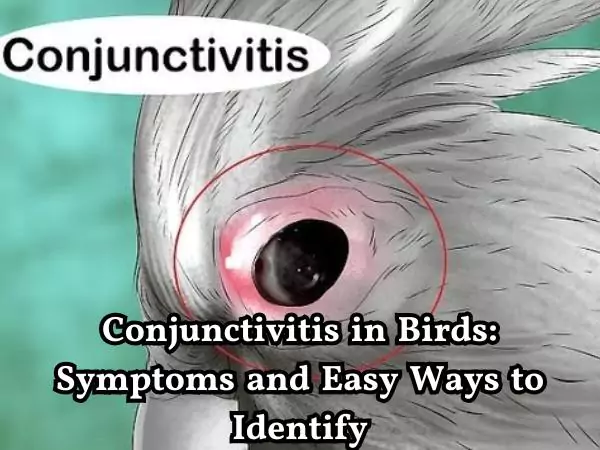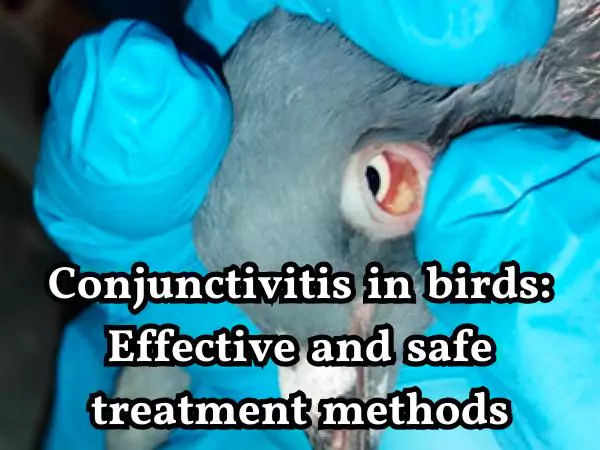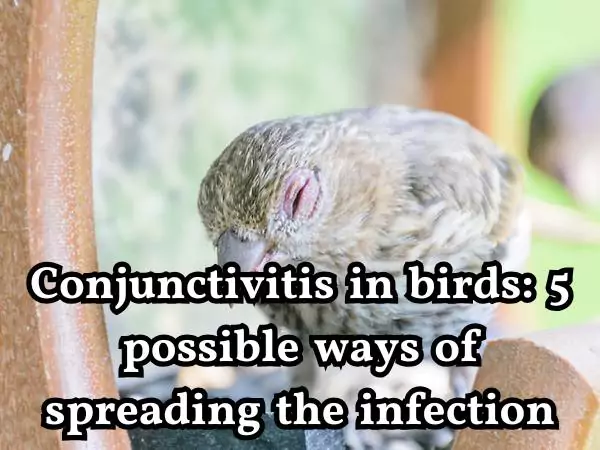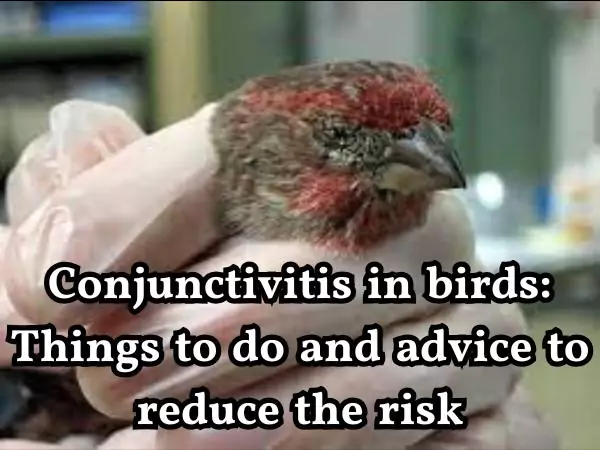Introduction
Conjunctivitis in birds’ eyes—it’s like an unknown terror just hearing it. Redness, swelling, or discharge from the eyes—these can happen not only to humans but also to birds. Conjunctivitis in birds is an eye disease that reduces their vision and causes physical discomfort. Many bird lovers don’t realize it, but if not treated in time, it can be fatal.
Conjunctivitis in birds symptoms Although mild at first, it can quickly spread to other birds. Conjunctivitis in birds causes can be viruses, bacteria or environmental dust. Failure to recognize it can lead to incorrect treatment, so proper conjunctivitis in birds is essential.
Conjunctivitis in Birds: Symptoms and Easy Ways to Identify

Conjunctivitis in birds means an infection or inflammation of the bird’s eyes. It may seem like a minor problem at times, but it can be serious if not treated properly. This problem usually manifests itself in redness around the eyes, closing the eyes, or watering from the eyes. An easy way to recognize conjunctivitis in birds is to see changes in the bird’s behavior — such as eating less, rubbing the eyes, or closing one eye. Sometimes, pus accumulates in the bird’s eyes, which appears as a yellow or white layer under the eye. It is important to take it to a veterinarian to diagnose conjunctivitis in birds, but early recognition of the symptoms makes initial treatment easier.
Conjunctivitis in birds: What are the symptoms to watch out for in the eyes?
Conjunctivitis in birds is a very common eye disease, but it can be fatal if not treated on time. It is easier to start treatment if some of the symptoms are recognized quickly. Below are some common signs of conjunctivitis in birds:
- Redness and swelling of the eyes.
- White or yellow pus discharge from the eyes.
- Keeping one or both eyes half-closed.
- Rubbing the eyes or frequently touching the eyes with the wings.
- Dry or hardened layer around the eyes.
If these symptoms are seen, you should seek medical attention immediately.
Conjunctivitis in Birds: What can cause it?
Conjunctivitis in birds can be caused by many things, but the main cause is bacteria, viruses, or dust. Sometimes conjunctivitis can be caused by an unhealthy cage environment, smoke in the air, or infection from other birds.
Conjunctivitis in birds: Effective and safe treatment methods

There is nothing to be afraid of if you have conjunctivitis in birds. If you start proper treatment quickly, the bird will recover. For treatment, you first need to understand the cause of the infection. If it is bacterial, then antibiotic eyedrops are needed. If it is viral, rest and cleanliness are important. The house should be kept clean so that there is no re-infection. Before starting treatment, consult an experienced veterinarian. He will tell you the appropriate medicine, dosage and care rules.
Conjunctivitis in birds: List of home and professional treatment methods
The following methods are most effective in controlling conjunctivitis in birds:
- Wash the eyes with clean water every day.
- Use antibiotic eyedrops on the advice of a veterinarian.
- Keep the bird’s cage and surroundings completely disinfected.
- Keep the infected bird isolated from others.
- Feed nutritious food to increase the body’s immunity.
- Conjunctivitis in birds requires not only home remedies, but also professional treatment.
Conjunctivitis in birds: Is it contagious and how is it spread?
Conjunctivitis in birds can often spread easily from one bird to another. Especially if it is caused by a virus or bacteria, the infection can be severe. The risk of spreading the disease is higher if the bird is kept in the same cage or eating and drinking together. Therefore, it is very important to keep the bird separate and keep the cage sterile. This disease is not usually dangerous for humans, but it is better to be careful. Conjunctivitis in birds can also be spread through touch, airborne particles, or feces and urine.
Conjunctivitis in birds: 5 possible ways of spreading the infection

Conjunctivitis in birds is usually spread in the following ways:
- Direct contact from one bird to another.
- Sharing the same food and water.
- Living in an unclean cage.
- Contact with feathers or eye fluids of a sick bird.
- Through airborne germs.
It is very important to know these things to prevent conjunctivitis in birds.
Conjunctivitis in birds: Home preventive strategies and awareness
Conjunctivitis in birds often occurs due to very small mistakes. Therefore, it is possible to avoid this disease by taking some simple steps at home. Keeping the bird’s cage clean, providing proper food, and ensuring adequate light and air can greatly prevent conjunctivitis in birds. With regular monitoring and awareness, redness, watering, or closing of the eyes in a bird can be easily detected.
5 Effective Ways to Prevent Conjunctivitis in Birds at Home
If you want to prevent conjunctivitis in birds, there are some measures you can take at home. Below are five important tips:
- Clean cage and water: Wash the cage and food and water bowls every day.
- Proper diet: Give food rich in vitamins A and E.
- Sunlight: Place the cage in a place where there is enough sunlight.
- Spend time with the bird: Observe any changes in the eyes.
- Keep it isolated from other birds: Keeping a sick bird isolated stops the spread.
If eye problems appear again after 4-5 days, the bird should be taken to the doctor.
Read More:
Conjunctivitis in birds: Things to do and advice to reduce the risk

To reduce the risk of conjunctivitis in birds, it is important to follow some precautions in advance. This disease can be easily avoided with proper care and awareness. If conjunctivitis in birds is affected, it can spread to other birds, so taking action in advance is the safest way. The risk can be greatly reduced by regularly monitoring the cage environment, food quality, and bird behavior. If you want to keep your birds healthy, you should pay attention to these things every day.
- Necessary awareness tips to prevent conjunctivitis in birds.
- If you want to keep your birds healthy, follow the following tips:
- Get regular checkups with a veterinarian.
- Check before bringing new birds into the cage.
- Keep the house dust-free and ensure air circulation.
- Seek treatment if you see redness or swelling in your bird’s eyes.
- Use a separate towel to care for your bird instead of touching its eyes.
What is conjunctivitis in birds?
Conjunctivitis in birds is a common eye disease that can be troublesome for birds. This disease causes swelling, redness, and watering around the eyes. Conjunctivitis in birds can sometimes be caused by dust, bacteria, or viruses. If you have eye problems, it is necessary to seek treatment without delay. Regular cleaning and proper feeding are very important in caring for birds’ eyes. Keep the bird’s nest clean and comfortable to prevent conjunctivitis in birds.
Symptoms of conjunctivitis
- Swollen eyes.
- Red eyes.
- Watery eyes.
- Birds keep their eyes closed
- Vision problems.
If these symptoms appear, consult a veterinarian without delay. Conjunctivitis in birds can be cured quickly if caught in the early stages.
What to do if you have conjunctivitis?

If you have conjunctivitis in birds, keep the bird in a clean environment. Remove dust, smoke, or any harmful substances from their home. Keep the bird isolated so that the disease does not spread. To treat conjunctivitis in birds, the veterinarian may prescribe antibiotics or eye drops if necessary.
- Mild salt water can also be used to clean the eyes.
- What to do in daily care
- Clean the bird cage every day
- Keep the water bowl clean and filled
- If you see dirt in the eyes, clean it with a soft cloth
- Keep it in a separate cage in case of infection
- Seek regular veterinary advice.
- Doing these things every day to recover from conjunctivitis in birds will benefit you.
The most important thing to prevent conjunctivitis in birds is to keep the environment around the bird clean. It is important to give the bird proper food, clean water and rest. It should be kept away from dust, smoke, perfumes or sources of allergies. To keep conjunctivitis in birds away.
Conclusion
Every bird is part of our family. Their healthy eyes mean their safe life. Conjunctivitis in birds may seem small, but it can cause very big problems. Therefore, it is important to take quick action as soon as you see the symptoms. If you see abnormalities in the eyes, it is not negligence, but rather take proper conjunctivitis in birds treatment and preventive measures.
Keep the bird isolated, keep it clean, and if necessary, seek the help of an experienced veterinarian. It is your responsibility to make your little beloved bird’s eyes shine again. Now that you are aware of this disease, start working now. And if you want to share this information with someone—don’t forget to forward this article. Spread the love, let the birds live!
FAQ
What are the symptoms of conjunctivitis in birds?
Redness, swelling, discharge or frequent blinking of the eyes are common symptoms of conjunctivitis in birds symptoms. If not recognized in time, the infection can spread.
How to treat conjunctivitis in birds at home?
Cleaning the eyes with cotton wool in lukewarm water, a clean cage and healthy food are effective as conjunctivitis in birds home remedies.
Is conjunctivitis in birds contagious to other birds?
Yes, it can spread from one bird to another. Therefore, it is important to know that conjunctivitis in birds is contagious and keep it separate.
What causes conjunctivitis in birds?
Dust, viruses, bacteria, or nutritional deficiencies are the main causes of conjunctivitis in birds causes.
Can conjunctivitis in birds be prevented?
Clean cages, clean food and regular eye examination are important parts of conjunctivitis in birds prevention.
What is the diagnosis process for conjunctivitis in birds?
Correct conjunctivitis in birds diagnosis is made by observing the condition of the eyes and doing lab tests if necessary.
What is the best home remedy for conjunctivitis in birds?
Chamomile tea packs and washing the eyes with antiseptic water can be a good conjunctivitis in birds home remedy.
Which antibiotics are used for conjunctivitis in birds?
Terramycin, doxycycline, etc. are used as conjunctivitis in birds antibiotics but veterinary advice is required.
Are eye drops effective for conjunctivitis in birds?
Yes, conjunctivitis in birds eye drops given by a veterinarian help reduce eye inflammation.
Is there any natural treatment for conjunctivitis in birds?
Natural ingredients like aloe vera gel or rose water can be used as a conjunctivitis in birds natural treatment.

